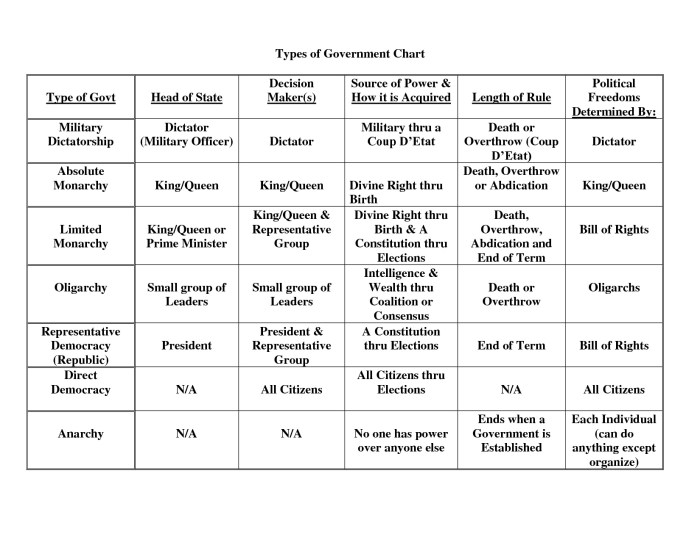Embark on a journey into the realm of government systems with our Types of Government Worksheet Answers. This comprehensive guide delves into the intricacies of various government structures, empowering you with a thorough understanding of their characteristics, advantages, and disadvantages.
As we navigate through this exploration, we will uncover the historical evolution of government systems and shed light on the modern trends shaping their landscape. Prepare to unravel the complexities of governance and gain invaluable insights into the foundations of political systems.
Types of Government

Government systems can be classified into various types based on their structure, powers, and the relationship between the government and the people. The main types of government systems include:
- Monarchy
- Republic
- Dictatorship
- Democracy
- Oligarchy
- Theocracy
Characteristics of Government Systems

Monarchy
- Head of state is a monarch (king, queen, emperor)
- Monarchy can be absolute (monarch has absolute power) or constitutional (monarch’s power is limited by a constitution)
Republic
- Head of state is an elected official (president, prime minister)
- Power is divided among different branches of government (executive, legislative, judicial)
Dictatorship, Types of government worksheet answers
- Head of state is a dictator who has absolute power
- Dictatorships often suppress political opposition and civil liberties
Democracy
- Power is vested in the people
- Citizens have the right to vote and participate in government
Oligarchy
- Power is concentrated in the hands of a small group of people
- Oligarchies can be based on wealth, family, or military power
Theocracy
- Government is based on religious principles
- Religious leaders have political power and authority
Advantages and Disadvantages of Government Systems
Monarchy
- Advantages: Stability, continuity, symbolic unity
- Disadvantages: Lack of accountability, potential for tyranny
Republic
- Advantages: Accountability, representation, checks and balances
- Disadvantages: Potential for gridlock, political instability
Dictatorship, Types of government worksheet answers
- Advantages: Efficiency, decisive leadership
- Disadvantages: Lack of freedom, human rights abuses, corruption
Democracy
- Advantages: Freedom, equality, participation
- Disadvantages: Slow decision-making, potential for mob rule
Oligarchy
- Advantages: Stability, efficiency
- Disadvantages: Lack of representation, inequality
Theocracy
- Advantages: Social cohesion, moral guidance
- Disadvantages: Suppression of religious freedom, potential for intolerance
Historical Development of Government Systems

Government systems have evolved over time, from early forms of tribal governance to the modern nation-state. Some key historical developments include:
- The rise of monarchies in ancient civilizations
- The development of democratic principles in ancient Greece and Rome
- The spread of constitutionalism in the 18th and 19th centuries
- The rise of totalitarian dictatorships in the 20th century
- The emergence of democratic movements and the spread of democracy in the post-World War II era
Modern Trends in Government Systems

Modern government systems are facing a number of challenges and opportunities, including:
- Globalization and the rise of international organizations
- The increasing use of technology in government
- The growing demand for transparency and accountability
- The challenges of climate change and environmental sustainability
- The rise of populism and nationalism
Top FAQs: Types Of Government Worksheet Answers
What are the main types of government systems?
There are three main types of government systems: democracy, monarchy, and dictatorship.
What are the key characteristics of a democracy?
Key characteristics of a democracy include free and fair elections, rule of law, protection of individual rights, and majority rule with minority rights.
What are the advantages and disadvantages of a dictatorship?
Advantages of a dictatorship include quick decision-making and efficient implementation of policies. Disadvantages include lack of accountability, suppression of dissent, and limited individual freedoms.